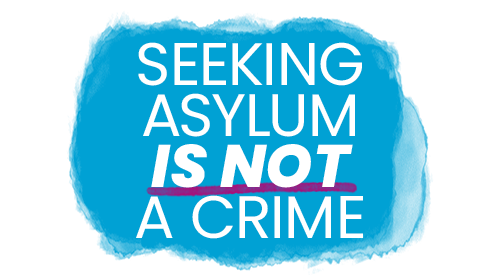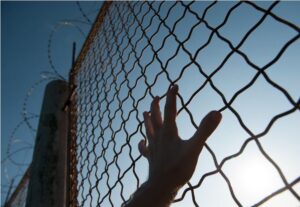There is no such thing as an ‘illegal’ asylum seeker

JVL Introduction
In response to the recent hysteria about refugess seeking to enter Britain, we reproduce an appeal for funds from the Refugee Council and a simple statement of facts about refugees.
This article was originally published by Refugee Council on Fri 14 Aug 2020. Read the original here.
There is no such thing as an 'illegal' asylum seeker.
Did you know that under international law anyone has the right to apply for asylum in any country that has signed the 1951 Refugee Convention?
This means ‘illegal’ or ‘bogus’ asylum seekers do not exist.
With the recent comments made by politicians and in the media, it can be hard to know the truth. Right now it’s more important than ever to stand together to fight the misinformation and hold the Government to account.
There is nothing in international law to say that refugees must claim asylum in the first country they reach.
A European regulation allows a country such as the UK to return an adult seeking asylum to the first European country they reached. This means that countries on the edge of Europe have responsibility for a lot more asylum seekers than others.
Currently, there are no legal routes for people to travel to the UK for the purpose of claiming asylum
This means that refugees feel forced to make dangerous journeys, like crossing the channel in small boats, and can fall victim to trafficking and dangerous smuggling practices.
That’s why we are calling for the government to make more safe and regular routes for people to claim asylum in the UK – such as a stronger resettlement programme, humanitarian visas and reformed family reunion rules.
The truth about asylum
Looking for the facts about asylum? The same old myths and scare stories about refugees and people seeking asylum are peddled again and again. You can rely on the facts and figures below to get the true picture – and help spread the truth about asylum.
- Refugee
The definition of a refugee according to The 1951 United Nations Convention Relating to the Status of Refugees is:
“A person who owing to a well-founded fear of being persecuted for reasons of race, religion, nationality, membership of a particular social group or political opinion, is outside the country of his nationality and is unable or, owing to such fear, is unwilling to avail himself of the protection of that country; or who, not having a nationality and being outside the country of his former habitual residence as a result of such events, is unable or, owing to such fear, is unwilling to return to it.”
In the UK, a person becomes a refugee when government agrees that an individual who has applied for asylum meets the definition in the Refugee Convention they will ‘recognise’ that person as a refugee and issue them with refugee status documentation. Usually refugees in the UK are given five years’ leave to remain as a refugee. They must then must apply for further leave, although their status as a refugee is not limited to five years.
- Asylum seeker (person seeking asylum)
A person who has left their country of origin and formally applied for asylum in another country but whose application has not yet been concluded. Wherever possible, we prefer to describe someone as a person seeking asylum as we feel that the term asylum seeker is dehumanising.
- Refused asylum seeker
A person whose asylum application has been unsuccessful and who has no other claim for protection awaiting a decision. Some refused asylum seekers voluntarily return home, others are forcibly returned. For some, it is not safe or practical to return until conditions in their country change.
- Migrant
Someone who has moved to another country for other reasons, such as to find work.
Developing countries – not the UK – look after most of the world’s refugees
85%
of refugees live in countries neighbouring their country of origin
- At the end of 2019 around 79.5 million people were forcibly displaced across the world. Of these, 29.6 million were refugees, whilst 45.7 million were internally displaced within their country of origin.
- 85% of the world’s refugees are living in countries neighbouring their country of origin, often in developing countries.
- Over 6.7 million people have fled conflict in Syria, and many more are displaced inside the country. Turkey is the biggest refugee hosting country in the world. At the end of 2019 Turkey was providing safety to 3.6 million Syrian refugees. By the end of June 2020 the UK had resettled 20,007 Syrian refugees under the Vulnerable Persons Resettlement Scheme (VPRS).
1%
The UK is home to approx. 1% of the 29.6 million refugees, forcibly displaced across the world.



Thank you for this illuminating summary
It’s so good to read the actual facts about asylum seekers rather than the many misrepresentations that get portrayed by so many.Thankyou for this article.
thank you very much for this information which I needed. I suspect many people in the UK need this information too.